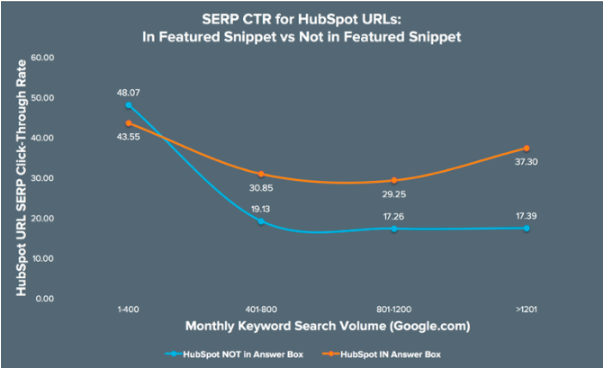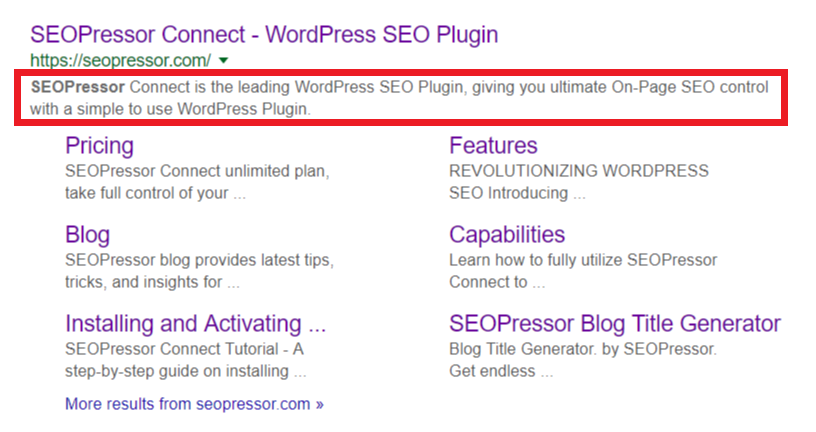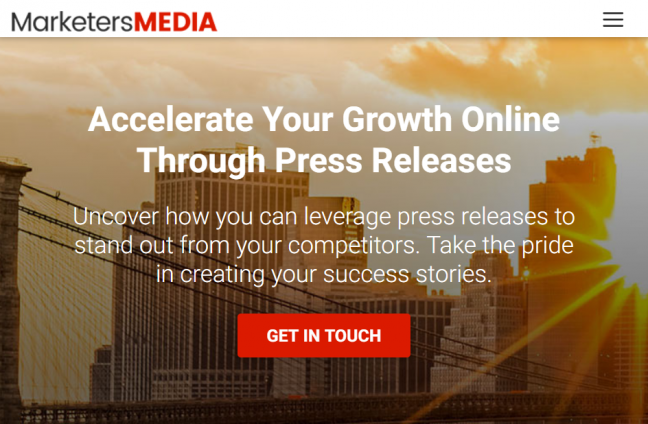Steph W. from SEOPressor


...help you check your website and tell you exactly how to rank higher?


93
score %
SEO Score

Found us from search engine?
We rank high, you can too.
SEOPressor helps you to optimize your on-page SEO for higher & improved search ranking.
By vivian on May 19, 2020

Click-through rates, or CTRs, are an important measure when it comes to optimizing search engines. They’re important because they are a good indicator of the relevance and value of your content and ads to users who search for certain terms.
More accurately, click-through rates represent the percentage of search users that end up clicking on your site after having seen your offer.
In other words, it is the number of times your web page is selected by a search user, as a proportion of the number of impressions (i.e. views) of the search entry on your web page.

Click-through Rates (CTR) = clicks / impressions.
That is to say if your web page appears in the search results 5,000 times, but has only been clicked on 5 times, your CTR will be 5/5000, that is 0.1%.
Moreover, in a bid to explaining what click rate means; we can simply say it is the percentage of people who visit your page (or email) and click on the desired link.
So, if you send an email to your list and 500 people view it, and 250 clicks on the product you’re offering, your click-through rate would be 50%.
Likewise, if you posted an article on your blog promoting a product and 100 people accessed this page and 38 clicked on the affiliate link, your click-through rate would be 38%.
The Google experience can sometimes seem overwhelming.
When you launch your AdWords campaigns for the first time, it is very easy to get discouraged.
It may all seem a bit difficult and intimidating, as you can begin to discover that your ad will be deactivated if the CTR (click-through rate) percentage is not high enough. Google requires a minimum CTR of 5%.

This basically means that you need to make sure that a certain percentage of people click on your ad when it appears. Google automatically adjusts your bids to keep you ahead of the competition at the lowest price.
Note: Click through rate (CTR) is the number of clicks received by your ad divided by the number of times your ad is shown (impressions). Whereas, the cost per click (CPC) is the amount you pay each time a user clicks on your ad.
The location of your ad on the search results page is determined by several factors. The amount you are willing to pay per click for that specific keyword or keyword phrase is not the only factor.

The AdWords system uses a cost-per-click (CPC) and click-through rate (CTR) formula, which improves your Adword ranking without increasing your cost per click.
The higher your CTR%, the more it will appear on the search results page.
Generally speaking, the higher your listing, the more clicks you receive. That’s why you want consistent keywords in the title, alt, and file name, to be the same or very similar.
The trick is to make every click count, so you pay less per click.
When bidding on keywords, being in the lead shouldn’t be your number one priority, but being on the first page is a must. In the middle, it’s a good start, without paying much per click.
That’s CTR in terms of ad, however at the same time it’s also a good indicator for your relevance and value.
In a way, click-through rate also gives you a good idea of how your copy works.
If you have written a good ad, message or email that makes the prospect really want to know more, chances are you will have a high click-through rate.
If your ad doesn’t get a very high CTR, it’s probably time to go back to the drawing board and try something new (if possible, test them against each other).
This also applies to blog post writing, as the way you craft your headlines and meta descriptions can also influence your readers decision if they click on your post in the SERP.
With that said, there are many different factors that determine what a good CTR is.
The sectors in which you operate and the type of ad you use are the most important. If you send emails, you can get at least a CTR of 50%.
If you run an AdWords campaign, you want at least a CTR rate of 1% for your keywords. If you have Google AdSense on your website or blog, you want at least a CTR of 10 to 15%.
Do you write great and thoughtful articles, but don’t get results? A good click-through rate can make the difference between the success and failure of a campaign.
So what is the secret to writing articles that achieve the ultimate goal of traffic and ultimately sales for your campaign?

Getting an organic ranking of the top three on Google guarantees high organic traffic to your site from the search engines. However, this does not mean that you have guaranteed this traffic forever. One way to do this is to increase CTRs.
It’s been five years since Google launched snippets, yet, for many marketers, it is yet another mystical puzzle.
If you are still not convinced that featured Google extracts can be useful in your SEO, today is an opportunity for me to change your point of view.
There are some important facts about these snippets. First, the snippets presented always arrive before the organic results.
And that’s why I called them “#0 ranking position”. In this scenario, the first organic results will be pushed below the “people ask too” box.
In addition, you will always have two lists on the results page for one page. Remember that the featured snippets may not always come from the first organic result, but you will certainly have two lists.
Now the question is, how exactly does Google choose which snippet to highlight?
The answer is simple: “Right Format”, which may vary depending on the specifications of Google’s algorithm. The snippets presented can be:
And without any disparity, any site can get featured on the SERP ratings. Now it’s the positive side.
There are also disclaimers for featured snippets. You can search and find the code snippet now, but it may not be available after an hour. Likewise, just as you can improve your CTR, you can also reduce it.
This section is to provide you with the knowledge you need to increase your CTR. Why would you want to do this? Well, there are many different reasons, but for now, I want to focus on two.
The first reason why you want to increase your CTR is that you want to increase your sales. The more clicks you get, the more likely you are to get the sale.
The second reason is that the better your CTR, the less you will pay per click. Your cost per click will decrease due to a good track record with your CTR. In other words, the better your CTR, the less you pay per click.
Now, how do you go about this? Below are a few tips on how to increase your click-through rates.

This is commonly known to advertisers, but the importance cannot be overstated. You must use the exact keyword you are targeting in the title.
This helps a lot in placing your ad and is also good for readers. If you’re struggling to present a good headline, you can always hire a copywriter to do the work for you.
You should always use keywords; place the main keyword at the front followed by a secondary keyword. For example, if one of your key phrases was “weight gain”, you would put it in parentheses like this [weight gain].
If you are not targeting your keywords correctly, someone looking for “how to lose weight” can show your ad for gaining weight. Somehow, I think they don’t click on your ad.
There’s nothing like a professionally written PPC ad and it starts with the correct capitalization of the title. As a general rule, with the exception of words like a, an, on, etc., you must capitalize all the words in the title.

Remember that the title grabs the attention of readers and determines whether or not they want to click on it.
For example, A title like “Buy birthday cakes now” should be replaced with “Buy Birthday Cakes Now!“, Which looks much more attractive and professional and will certainly increase the CTR.

Meta description tags are another piece of the biggest algorithmic puzzle. These meta tags are analyzed by Google when deciding which results are relevant to user searches.
Meta tags are basically text inserted into the source code of an e-commerce site that includes keywords to provide Google with information about the content of a page for SEO purposes.
Meta descriptions are extremely important in determining the ranking of search engines. Meta descriptions are a type of meta tag used to describe the page.
These are short summaries, about 200 characters or less, that allow owners of the website to define how the page will be described in SERPs.
Not all engines use them, and Google only uses the first 150 characters of a website’s Meta description. Also, we cover more about the best practices for high CTR meta descriptions writing here, so do give it a read!
The recognition of your brand online, between users and visitors, is an essential element of your online reputation and an essential element of your online presence.
Without strong branding authority, you are an unnamed entity that fights your best-known competitors.
Creating brand authority will help you improve the SEO of your website and its content, and there is no doubt that it will generate more interest in your brand and increase visitors to your website.
I have already mentioned many of these ideas in the context of content creation and SEO strategies, but we think it is worth emphasizing the importance of all of these communication tactics in building your authority online.
One of the most effective ways of building brand authority is by sending press releases. Check out MarketersMedia’s case study to learn more.

If you create a blog, you create your authority. Writing a regular, high-quality blog will increase interest and flowers. It provides a tool for regularly sharing information and content and keeps you at the forefront of people’s minds – the right way.
By creating an interesting, useful, inspiring, informative, fun, fascinating blog or anything that makes blogs popular, you are building your authority.
However, be sure to choose a blog topic and theme directly aligned with your brand; the main point is to create followers for your brand (your business), not for your hobby or your funny stories.
It is not easy to create interesting and memorable content for businesses, but it is possible to think carefully, creatively and, if necessary, hire an excellent writer who can do it for you.
You don’t want meaningless items; you want quality, conversational pieces that increase your brand’s reputation.
Of all the above elements in increasing your CTR, the bottom line is finding out what works best. You can prepare multiple announcements for the same purpose and compare their performance over a period of time.
If you find a particular text or title that attracts more clicks, stick to it. Until you get the right formula, experiment. Consider using tools like Google Optimize.

If you’re not sure where or how to start, read this: 50 A/B Tests You Need to Run To Improve Your Conversion Rate.
So, in conclusion, it is important that your website conveys the right message regarding your business. Otherwise, change. There is no quick and easy way to get good rankings on the major search engines.
If the keywords you target generate good traffic, it is worth spending the effort, money and time as they will pay off.
If you need quick income, choose long-tail keywords and be part of your short term strategy and premium keywords for long term strategy. It makes sense and works for many companies.
If your site is not aesthetic, modern, up to date or professional, change it again.
Even if you are already active in the search engine optimization process, it is important that the site itself is beautiful, correctly reflects your business, is usable, that the pages are linked semantically and so on.
Otherwise, the existing traffic you receive may not turn into regular visitors. .
It is essential that your website is right before you search for more positions on the search engine.
You don’t invite guests into a messy house, direct them to a dirty table and try to seat them on a broken chair, right? Your home represents you, only the website represents your business.
To see if you are doing a good job, always look at your click-through rate.
Updated: 3 July 2025


Save thousands of dollars (it’s 100x cheaper)

Zero risk of Google penalty (it’s Google-approved)

Boost your rankings (proven by case studies)
Rank High With This Link Strategy
Precise, Simplified, Fast Internal Linking.
